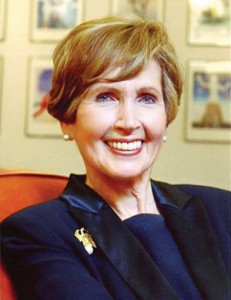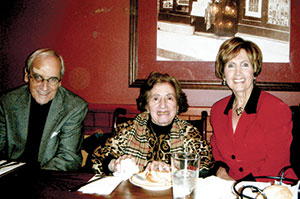
Constance Morella’s extraordinary ride to the heights of political power is a truly inspirational tale.
By Blake Maddux
Former U.S. Congresswoman Constance Morella, née Albanese, was born in Somerville on February 12, 1931. In the 82 years since then, “Connie” Morella has done government work that has taken her all around the world.
“I grew up in West Somerville,” she clarified via email, “which means that I went to Western Junior High School [on Hudson Street] when it existed.”
After graduating from Somerville High School in 1948, she attended Boston University, where she earned an Associate of Arts and Bachelor of Arts (in English) in 1950 and 1954, respectively.
In a recent telephone interview, Morella proudly proclaimed, “I’m a Somerville gal!”
However, it has been many decades since she lived here.
“My town has changed significantly,” she asserted. “It’s a booming town! It’s always been a very nice residential city. It tended to be a blue-collar worker area and rather traditional. And I think now it’s become, do they use the term ‘preppy’ anymore? It’s more youthful, more dynamic. It always was interesting and exciting, but it seems more dynamic.”
Morella had her first modest encounters with the political process as a high school and college student.
“I was an officer at Boston University. I was also very active in the student council and all at Somerville High School,” she said. “At BU, I had a campaign manager and everything. I was elected class secretary. At that point they didn’t have women presidents of the class.”
Raised in a blue-collar Democratic family, she became a Republican after meeting Anthony C. Morella, who had worked for liberal Republicans such as Maryland Senator Charles Mathias, New York City Mayor John Lindsay, and New York Governor and future U.S. Vice President Nelson Rockefeller.
Ms. Albanese married Mr. Morella, and the couple moved to the Washington, D.C., suburb of Bethesda, Maryland. In addition to raising three biological children, they adopted Ms. Morella’s sister’s six children after she died of cancer.
Upon arriving in Bethesda, Morella began a four-year stint as a secondary school teacher in the Montgomery County school system. In 1967, she received a master’s degree from American University.
After briefly serving as an adjunct instructor at American University, Morella became a professor at Montgomery College in 1970.
“I taught various levels of English,” Morella recalled, “including world literature, American literature, women in literature, writing, and basic English skills.”
Morella began engaging in politics not long after being hired at Montgomery College.
In 1972, she became a member of the first Montgomery County Commission for Women.
“1972 was when the Equal Rights Amendment [ERA] was signed by President Nixon,” Morella said. “I lobbied to get Maryland to pass it. Maryland finally did pass it, and 35 states actually passed it, but they needed 38. So to this day, we still do not have an Equal Rights Amendment to our Constitution!”
It was the fortuitous timing of her appointment to the Commission for Women and the push for the ERA that prompted Morella to run for office. After losing a bid for election to the Maryland House of Delegates in 1974, she successfully won the first of two terms to that body in 1978.
“The woman’s movement in general put the movement into me. You know, with employment, credit, housing, all of those opportunities that were not there for women are what inspired me to run for office. I was driven by issues, and not so much the desire for power.”
In 1986, U.S. Representative Michael Barnes gave up his seat in Maryland’s 8th congressional district in order to run for the U.S. Senate. Morella won the office in November 1986, becoming the first woman to represent the district.

Husband Anthony Morella, aunt Constance F. Lauro (100 years old in this photo), and Constance “Connie” Morella.
Morella stood out among her fellow Republicans, consistently voting against the majority of her party’s members on volatile issues such as abortion, gun control, and gay rights. She also voted against use of force in Iraq in both 1991 and 2002, and made symbolic votes against making English the official language of the United States, renaming the Washington National Airport after President Ronald Reagan, and the impeachment of President Bill Clinton.
“I think the nice way to put it was to say ‘a moderate Republican,’ but I really tended to be more on the liberal side. Maybe that’s a part of Massachusetts in me!”
Despite being—in her words—“out of the box” in the Grand Old Party, and despite representing what she said was at one point considered “the most Democratic district held by a Republican,” Congresswoman Morella won a total of seven terms, often carrying 60 or 70 percent of the vote in winning reelection.
Morella attributes her electoral success and her ability to remain independent to the respect that she had for and got from both colleagues and constituents.
Of her fellow Republicans, she said, “I think I had the respect of my colleagues, which is why I got away with so much (laughs), if I can put it that way! I was never nasty to them. I was always very civil. They always knew how I was going to vote.”
As for her constituents, Morella said, “I got to know the people. I went to every bar mitzvah, every christening, [and] every opening. I gave speeches and did town hearings and town meetings. Charlie Cook—who was the great prognosticator, still is—was a constituent of mine, and he said, ‘That Morella, she will go to the opening of an envelope’.” Cook is the publisher of The Cook Political Report, an influential non-partisan newsletter that he founded in 1984.
In 2002, several powerful members of Maryland’s Democratic Party decided that it was time to wrest the 8th congressional district from Congresswoman Morella’s Republican hands. These forces conspired to redraw (“gerrymander”) the district to include more Democratic voters. Chris Van Hollen, who still occupies the seat, defeated Morella 52 percent to 47 percent.
“I probably would have stayed one more term,” Morella said, laughing. “Frankly, one of the reasons I wanted to run again is I wanted to show them that gerrymandering wasn’t going to work.”
In 2003, President George W. Bush appointed her the U.S. ambassador to the Organization for Economic Cooperation and Development (OECD), which is headquartered in Paris, France.
It was this appointment that allowed Morella to literally and figuratively have the last laugh about losing her seat in Congress: “Involved with the redistricting was our [Maryland’s] governor. His name: Parris Glendening. So what I said was, ‘Well, I went from Parris Glendening to Paris, France. So who won that election?’ I told him that, too!”
But she must miss something about being in Congress, right?
“I sure miss staff! You know what they say: When you’re no longer in office, you get into the back seat of your car and it doesn’t start!”
Morella’s OECD term ended in 2007. The following year, she was a resident fellow at Harvard University’s Kennedy School of Government, where she taught a class called “An Endangered Species: The Moderate in the House of Representatives.” In 2010, President Barack Obama appointed her to the American Battle Monuments Commission. Morella is also currently president of the Association of Former Members of Congress and is a faculty member of the School of Public Affairs and the Women & Politics Institute at American University.
Given this wealth of experience, which includes having been in Congress for the government shutdown of 1995-1996, what would she do if it were put in a room with assorted political leaders to resolve the current impasse in Washington, D.C.?
“I think I’d keep them there and lock the door,” she said. “And give them water and maybe a little bread or crackers or something. I think I’d do what they did to the Constitutional Convention: just keep them there till they come up with a solution. ‘You cannot leave until you do!’”












Reader Comments